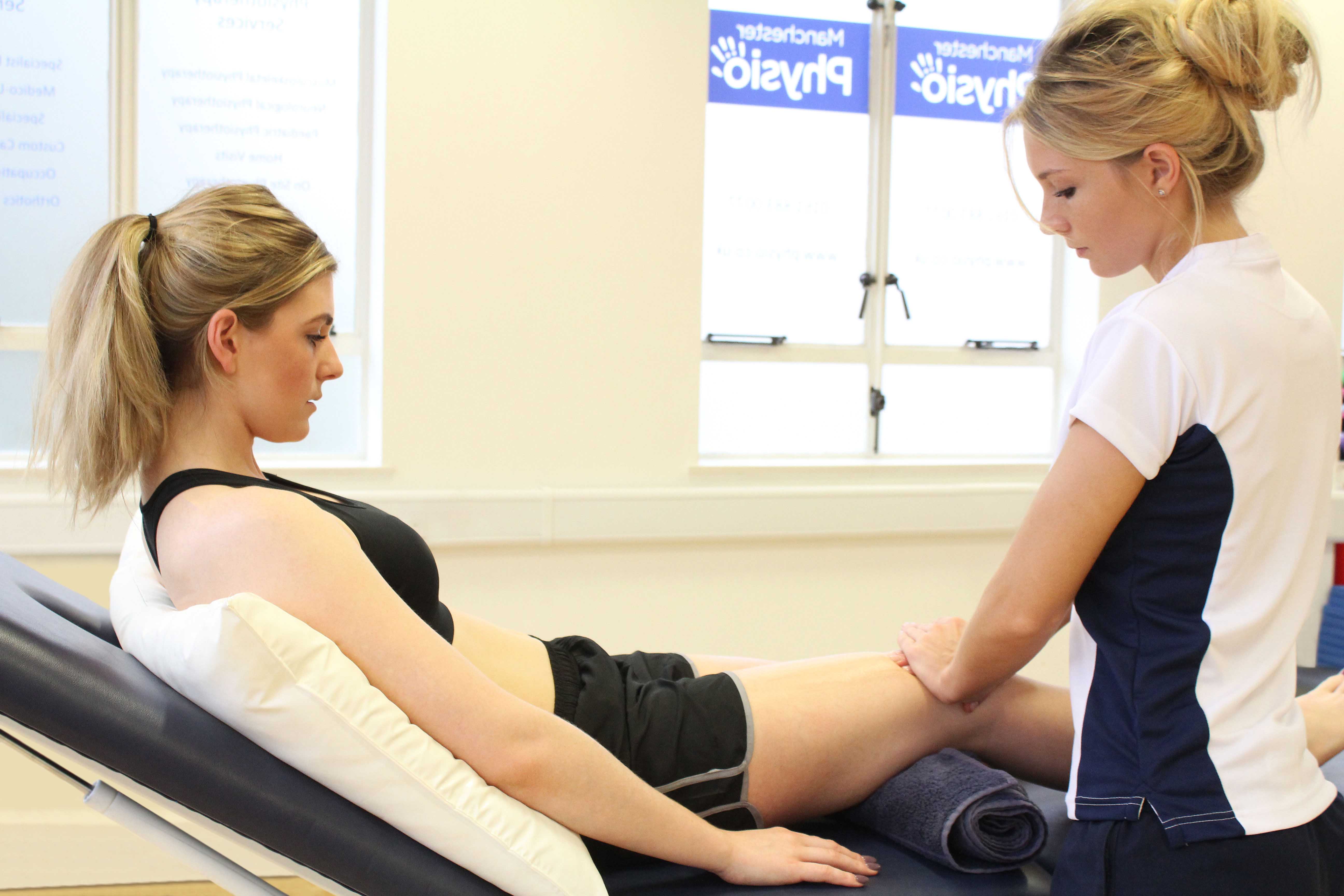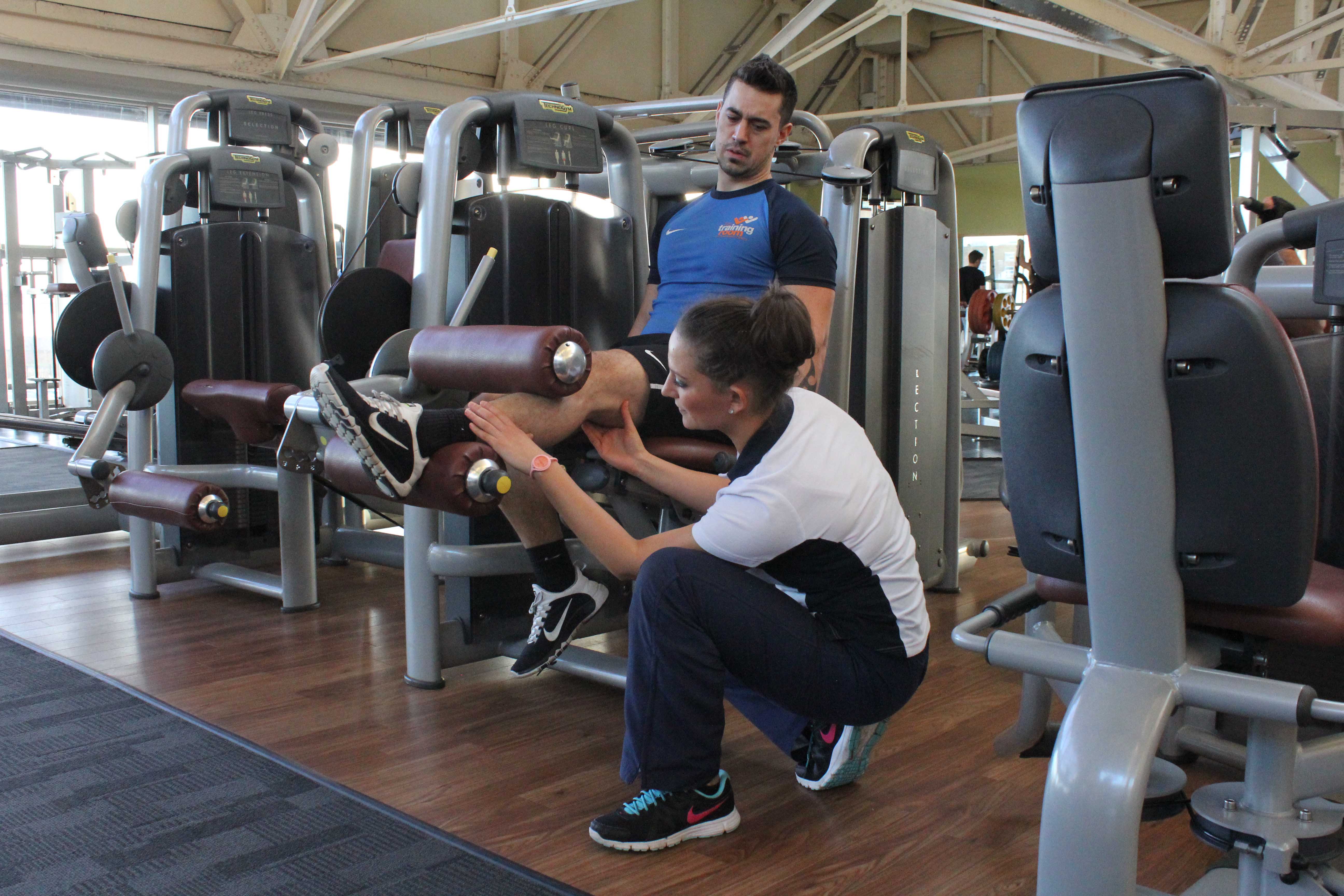What is a lateral collateral ligament injury?
The lateral collateral ligament is a tough band of tissue that provides support along the outside of the knee joint. A lateral collateral ligament injury is a sprain (or tear) to this ligament. Physiotherapy is an important treatment for a lateral collateral ligament injury.
How does a lateral collateral ligament injury happen?
The lateral collateral ligament occurs if the knee is caused to bend outwards, overstretching and injuring the lateral collateral ligament. This commonly occurs from a blow to the inside of the knee whilst the foot is planted on the ground.
 Above: Therapist performing soft tissue massage and mobilisations on the patella and surrounding connective tissue.
Above: Therapist performing soft tissue massage and mobilisations on the patella and surrounding connective tissue.What are the symptoms of a lateral collateral ligament injury?
The initial sensation felt when the lateral collateral ligament is injured is pain on the outside surface of the knee. You may also feel an audible snap, crack or tear. The knee joint often swells up and you may have difficulty walking due to pain. Other symptoms may include:
What should I do if I have a lateral collateral ligament injury?
You can speed up your recovery by following the simple RICE regime over the first 24–48 hours. Swelling is necessary for the injury to heal; however, too much swelling can delay healing. The RICE regime (Rest, Ice, Compression, and Elevation) reduces blood flow to the injured area and, therefore, can reduce swelling. Rest involves limiting the amount of weight you put through your leg. The use of crutches may be required if you are having difficulty walking. Ice should be applied to the knee for 15–20 minutes every 1–2 hours. It should be applied using a bag of frozen peas or crushed ice wrapped in a damp cloth. Compression involves the application of an elastic bandage around the injury site. It should be firm but not tight. Elevation involves lying with your knee resting on a chair or pillows so that it is above the level of your heart. You should continue the RICE regime until you have been assessed by a physiotherapist. This should ideally be within the first 48 hours of the injury.
Physiotherapy treatment for a lateral collateral ligament injury.
Physiotherapy is important in the treatment of a lateral collateral ligament injury of the knee. Initially, your physiotherapist can determine exactly which tissues and structures have been damaged and the extent of this damage. In some cases, referral for imaging techniques such as an X-ray, ultrasound, CT or MRI scans may be required to confirm your diagnosis and future management. After the diagnosis, your physiotherapist will explain how long your injury should to take to heal and develop an appropriate treatment plan. Treatment can accelerate your recovery and often involves:
What shouldn’t I do if I have a lateral collateral ligament injury?
Following an injury to the lateral collateral ligament, you should not perform activities which increase blood flow to the injured area. These include hot showers, heat rubs, the consumption of alcohol and excessive activity. These activities can increase the bleeding and swelling around the injured ligament and prolong your recovery.
 Above: Progressive knee strengthening exercises performed under supervision of experienced MSK physiotherapist
Above: Progressive knee strengthening exercises performed under supervision of experienced MSK physiotherapistCould there be any long-term effects from a lateral collateral ligament injury?
Most lateral collateral ligament injuries heal within a number of weeks. Long term effects can be caused if other structures within the knee are damaged at the same time as the medial collateral ligament. Similarly, recovery may be delayed if the injury is not diagnosed and is not managed appropriately. A inadequately managed lateral collateral ligament injuries can result in a poorly healed ligament which is susceptible to reinjury.
To arrange a physiotherapy appointment call Physio.co.uk on 0330 088 7800 or book online.

 0330 088 7800
0330 088 7800





































